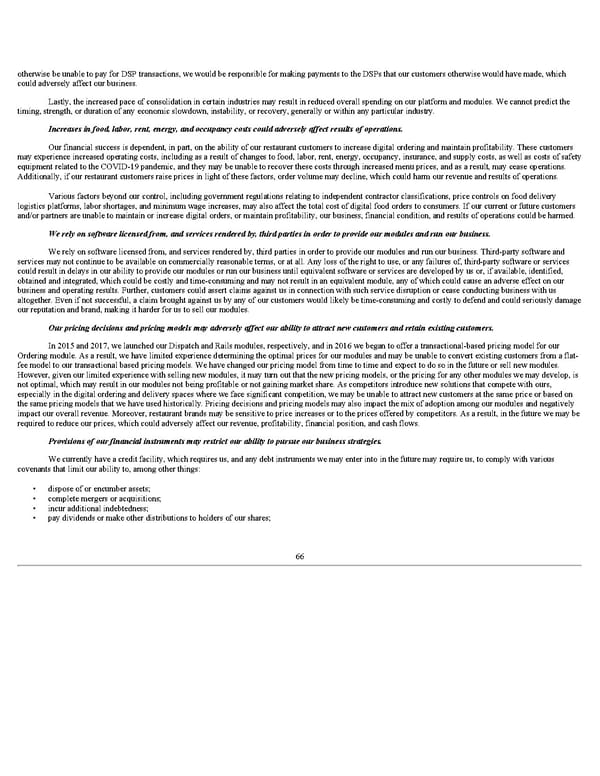otherwise be unable to pay for DSP transactions, we would be responsible for making payments to the DSPs that our customers otherwise would have made, which could adversely affect our business. Lastly, the increased pace of consolidation in certain industries may result in reduced overall spending on our platform and modules. We cannot predict the timing, strength, or duration of any economic slowdown, instability, or recovery, generally or within any particular industry. Increases in food, labor, rent, energy, and occupancy costs could adversely affect results of operations. Our financial success is dependent, in part, on the ability of our restaurant customers to increase digital ordering and maintain profitability. These customers may experience increased operating costs, including as a result of changes to food, labor, rent, energy, occupancy, insurance, and supply costs, as well as costs of safety equipment related to the COVID-19 pandemic, and they may be unable to recover these costs through increased menu prices, and as a result, may cease operations. Additionally, if our restaurant customers raise prices in light of these factors, order volume may decline, which could harm our revenue and results of operations. Various factors beyond our control, including government regulations relating to independent contractor classifications, price controls on food delivery logistics platforms, labor shortages, and minimum wage increases, may also affect the total cost of digital food orders to consumers. If our current or future customers and/or partners are unable to maintain or increase digital orders, or maintain profitability, our business, financial condition, and results of operations could be harmed. We rely on software licensed from, and services rendered by, third parties in order to provide our modules and run our business. We rely on software licensed from, and services rendered by, third parties in order to provide our modules and run our business. Third-party software and services may not continue to be available on commercially reasonable terms, or at all. Any loss of the right to use, or any failures of, third-party software or services could result in delays in our ability to provide our modules or run our business until equivalent software or services are developed by us or, if available, identified, obtained and integrated, which could be costly and time-consuming and may not result in an equivalent module, any of which could cause an adverse effect on our business and operating results. Further, customers could assert claims against us in connection with such service disruption or cease conducting business with us altogether. Even if not successful, a claim brought against us by any of our customers would likely be time-consuming and costly to defend and could seriously damage our reputation and brand, making it harder for us to sell our modules. Our pricing decisions and pricing models may adversely affect our ability to attract new customers and retain existing customers. In 2015 and 2017, we launched our Dispatch and Rails modules, respectively, and in 2016 we began to offer a transactional-based pricing model for our Ordering module. As a result, we have limited experience determining the optimal prices for our modules and may be unable to convert existing customers from a flat- fee model to our transactional based pricing models. We have changed our pricing model from time to time and expect to do so in the future or sell new modules. However, given our limited experience with selling new modules, it may turn out that the new pricing models, or the pricing for any other modules we may develop, is not optimal, which may result in our modules not being profitable or not gaining market share. As competitors introduce new solutions that compete with ours, especially in the digital ordering and delivery spaces where we face significant competition, we may be unable to attract new customers at the same price or based on the same pricing models that we have used historically. Pricing decisions and pricing models may also impact the mix of adoption among our modules and negatively impact our overall revenue. Moreover, restaurant brands may be sensitive to price increases or to the prices offered by competitors. As a result, in the future we may be required to reduce our prices, which could adversely affect our revenue, profitability, financial position, and cash flows. Provisions of our financial instruments may restrict our ability to pursue our business strategies. We currently have a credit facility, which requires us, and any debt instruments we may enter into in the future may require us, to comply with various covenants that limit our ability to, among other things: • dispose of or encumber assets; • complete mergers or acquisitions; • incur additional indebtedness; • pay dividends or make other distributions to holders of our shares; 66
 Q3 2021 10Q Page 71 Page 73
Q3 2021 10Q Page 71 Page 73